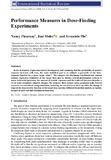Performance measures in dose-finding experiments
Fecha
2020Versión
Acceso abierto / Sarbide irekia
Tipo
Artículo / Artikulua
Versión
Versión publicada / Argitaratu den bertsioa
Impacto
|
|
10.1111/insr.12363
Resumen
In the first phase of pharmaceutical development, and assuming that the probability of positive response increases with dose, the main statistical goal is to estimate a percentile of the dose–response function for a given target Г. We compare the Maximum Likelihood and centred isotonic regression estimators of the target dose and we discuss several performance criteria to assess inferential preci ...
[++]
In the first phase of pharmaceutical development, and assuming that the probability of positive response increases with dose, the main statistical goal is to estimate a percentile of the dose–response function for a given target Г. We compare the Maximum Likelihood and centred isotonic regression estimators of the target dose and we discuss several performance criteria to assess inferential precision, the amount of toxicity exposure and the trade-off between them for a set of some exemplary adaptive designs. We compare these designs using graphical tools. Several scenarios are considered using simulation, including the use of several start-up rules, the change of slope of the dose-toxicity function at the target dose and also different theoretical models, as logistic, normal or skew-normal distribution functions. [--]
Materias
Adaptive designs,
Optimal designs,
Maximum tolerated dose,
Performance criteria
Editor
John Wiley & Sons
Publicado en
International Statistical Review, 2020, 1-24
Departamento
Universidad Pública de Navarra. Departamento de Estadística, Informática y Matemáticas /
Nafarroako Unibertsitate Publikoa. Estatistika, Informatika eta Matematika Saila
Versión del editor
Entidades Financiadoras
Fernando Plo and Jose Moler acknowledge the financial support received from the projects Ministerio de Economía y Competitividad (MTM2014‐53340‐P) and Secretaría de Estado de Investigación, Desarrollo e Innovación (MTM2016‐77015‐R).






